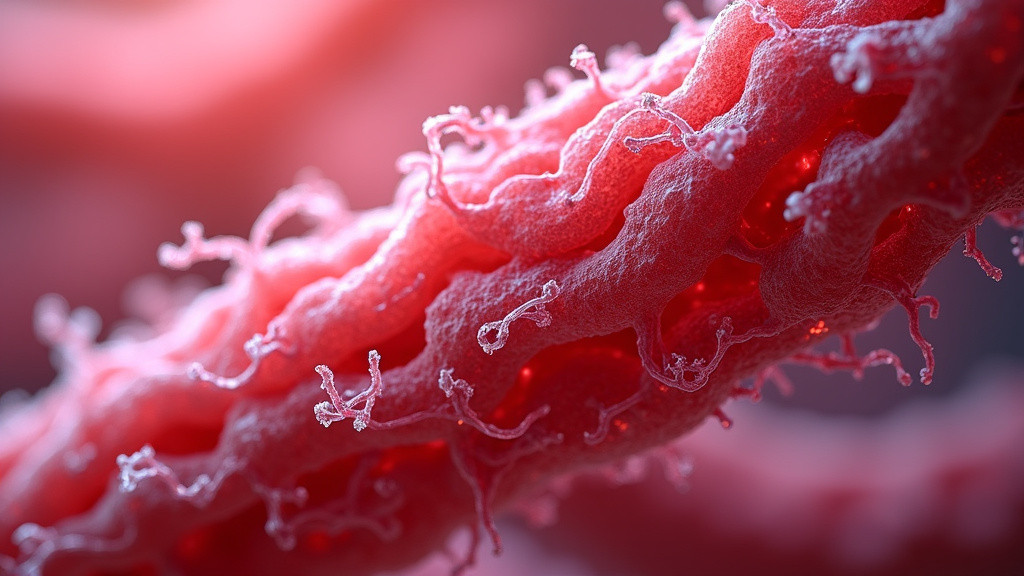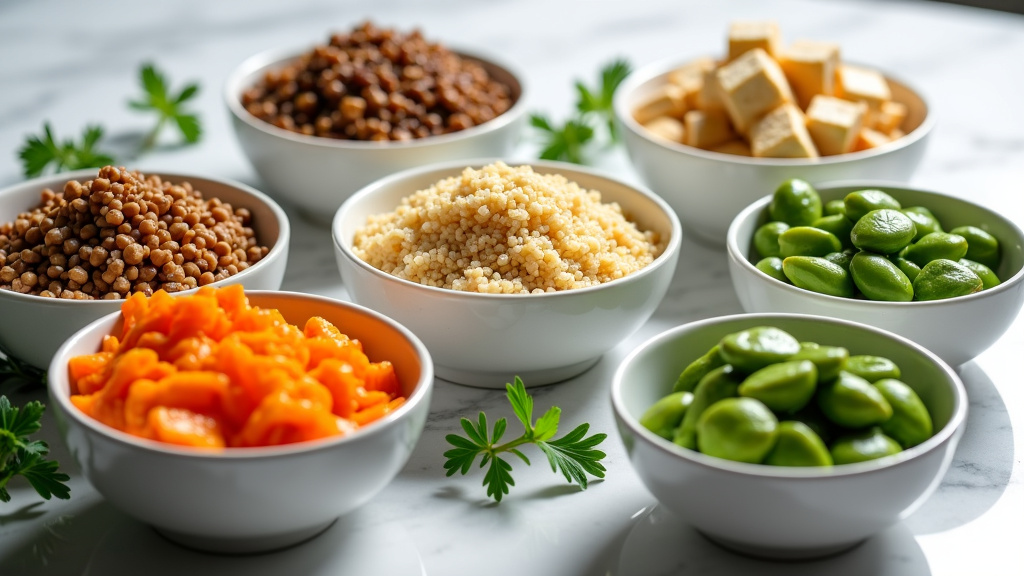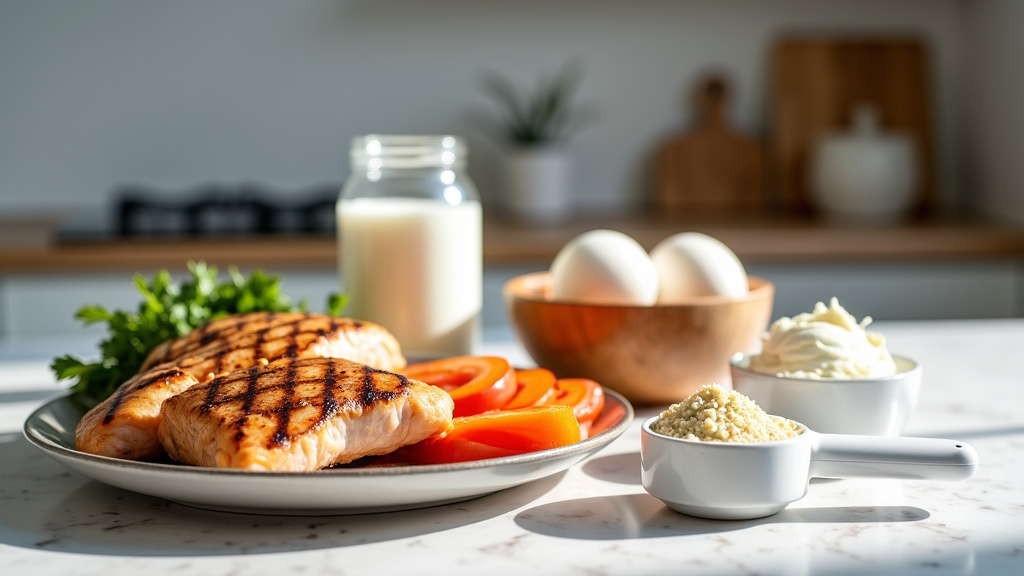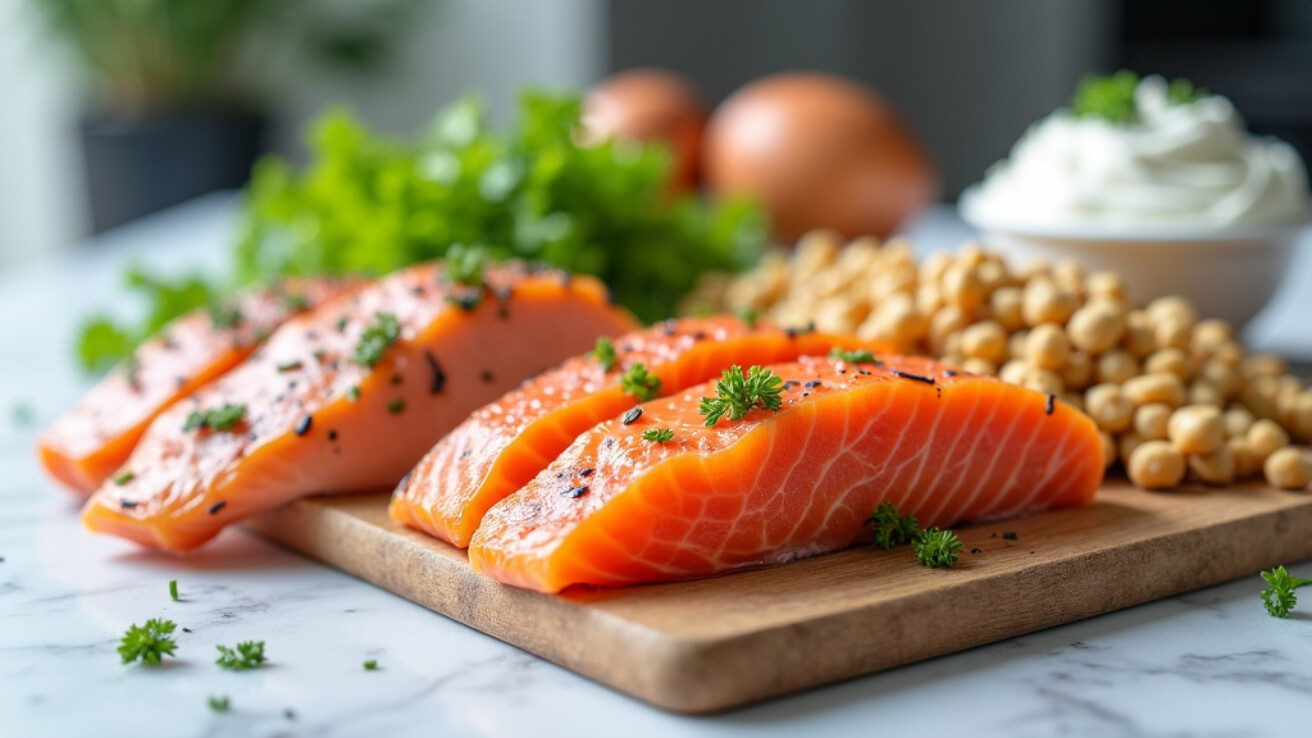Transforming your body and building lean muscle mass requires more than just pumping iron at the gym. It requires high protein foods.
While consistent resistance training breaks down muscle fibers, protein-rich foods provide the essential building blocks for repair and growth. Just like a house needs quality materials for construction, your muscles require adequate protein to reach their full potential.
When I work with clients aiming to build lean muscle, I emphasize that protein intake timing is just as crucial as the amount. Strategic protein consumption before and after workouts, along with high-quality protein sources spread throughout the day, helps optimize muscle protein synthesis and recovery.
Think of protein as your body’s repair crew – without enough workers (amino acids), the construction project (muscle building) slows down significantly. Whether you prefer animal proteins like chicken and fish, or plant-based options like legumes and quinoa, ensuring adequate protein intake is essential for achieving your muscle-building goals.
The Science Behind Protein and Muscle Growth

Think of your muscles like a house under renovation – when you perform resistance training, you create tiny tears in your muscle fibers, similar to knocking down walls during remodeling.
During resistance training, microscopic damage occurs within your muscle tissues, triggering a complex cascade of repair signals throughout your body. This damage happens whether you’re lifting weights, doing bodyweight exercises, or using resistance bands.
Just as construction workers need building materials to repair and reinforce walls, your body needs protein to rebuild damaged muscle fibers. Protein provides the essential amino acids that serve as the building blocks for this repair process.
When you consume protein after exercise, your body breaks it down into amino acids that stimulate muscle protein synthesis. A key research study shows that muscle protein synthesis increases significantly in the hours following resistance training, particularly when combined with protein intake.
The repair process doesn’t just restore muscles to their previous state – it builds them back stronger and larger than before. This adaptation prepares your body for future challenges, much like reinforcing a house’s foundation to withstand future stress.
To optimize muscle building, research indicates you should consume adequate protein within a few hours after exercising. This timing provides your muscles with essential raw materials when repair signals are at their peak.
| Timeframe | Protein Benefits |
|---|---|
| 0-30 minutes post-exercise | Initiates muscle repair and recovery |
| Within 2 hours post-exercise | Maximizes muscle protein synthesis |
| 2-4 hours post-exercise | Continues to support muscle repair |
| 4-6 hours post-exercise | Optimal window for prolonged muscle sensitivity to protein |
| Up to 24 hours post-exercise | Muscles remain sensitized to protein intake |
Over time, this cycle of damage and enhanced repair leads to noticeable increases in muscle size and strength. However, this adaptation only occurs when you provide your body with both the stimulus of resistance training and the proper nutrition to support recovery.
Top Animal-Based Protein Sources for Muscle Building
Looking to build quality muscle? Animal-based proteins deliver the essential amino acids your muscles need. As a performance nutrition specialist, I’ve found these high-quality proteins consistently deliver impressive results for my clients’ muscle-building goals.
Lean chicken breast stands out with 31 grams of protein per 100-gram serving. It provides vital B vitamins that support energy production during workouts. Try slicing it over salads or pairing with roasted vegetables for a muscle-fueling meal.
Eggs are nature’s perfect protein package, with a single large egg providing 6 grams of complete protein. The yolks contain essential nutrients like vitamin D and omega-3s that support muscle growth and recovery. Whether scrambled for breakfast or hard-boiled for snacks, eggs offer excellent versatility.
Dairy Protein Powerhouses
Greek yogurt delivers 20-25 grams of protein per cup. Its blend of fast and slow-digesting proteins makes it ideal for post-workout recovery. Mix in berries and nuts for a protein-rich breakfast or snack.
Cottage cheese provides 28 grams of protein per cup. Rich in slow-digesting casein protein, it supplies a steady stream of amino acids – perfect before bed to support overnight muscle recovery. Top with fruit or mix into smoothies for added protein.
For those watching calories, lean beef is another excellent choice, offering 26 grams of protein per 100-gram serving while providing iron and zinc for muscle function.
Fish: The Lean Protein Machine
Salmon delivers 25 grams of protein per serving, plus omega-3 fatty acids that reduce inflammation and support muscle recovery. Grill, bake, or pan-sear for a delicious protein boost.
Tuna provides 29 grams of protein per 100-gram serving. Whether fresh or canned, it’s one of the most convenient and affordable ways to meet your protein needs. Add to sandwiches or salads for a quick protein fix.
| Animal Protein Source | Protein Content (per 100g) | Additional Nutrients |
|---|---|---|
| Chicken Breast | 31g | B vitamins |
| Egg | 6g per large egg | Vitamin D, Omega-3s |
| Greek Yogurt | 20-25g per cup | Calcium, Probiotics |
| Cottage Cheese | 28g per cup | Casein Protein |
| Lean Beef | 26g | Iron, Zinc |
| Salmon | 25g | Omega-3 Fatty Acids |
| Tuna | 29g | Omega-3 Fatty Acids |
Plant-Based Protein Sources for Muscle Growth

If you think building muscle requires animal protein, think again. Plant-based proteins effectively support muscle development when consumed strategically.
Legumes stand out as protein powerhouses for muscle growth. Lentils pack an impressive 18 grams of protein per cup, while chickpeas provide roughly 15 grams. These protein-rich options also offer fiber and essential minerals.
Not all plant proteins are created equal, though. Quinoa distinguishes itself as one of the few plant-based complete proteins, containing all nine essential amino acids your body needs for muscle synthesis. One cup delivers approximately 8 grams of highly bioavailable protein.
Strategic Protein Combining for Optimal Results
While some may worry about getting enough protein from plants, research shows that consuming a variety of plant proteins throughout the day provides all essential amino acids needed for muscle growth. The old notion that you must combine specific proteins at every meal has been disproven.
Tofu and tempeh, both made from soybeans, offer complete protein profiles similar to animal sources. A cup of tofu contains 20 grams of protein, while tempeh provides 15 grams along with beneficial probiotics.
Edamame makes an excellent muscle-building snack, delivering 17 grams of protein per cup. These young soybeans also provide healthy fats and fiber that support overall athletic performance.
For optimal results, aim to consume protein from varied plant sources throughout the day. A morning smoothie with plant protein powder, lunchtime Buddha bowl with quinoa and chickpeas, and dinner featuring tofu or tempeh can easily help you meet your protein goals.
Addressing Common Misconceptions
Many athletes worry that plant proteins are inferior for building muscle. However, studies have shown that when consumed in adequate amounts, plant-based proteins are just as effective as animal proteins for supporting muscle growth and recovery.
The key is consuming enough total protein – about 1.6 to 2.2 grams per kilogram of body weight daily for those looking to gain muscle mass. This is entirely achievable through a thoughtfully planned plant-based diet.
Beyond protein content, plant-based foods provide additional compounds that support muscle growth and recovery. The fiber, antioxidants, and anti-inflammatory compounds found in whole plant foods can enhance training results.
The evidence is clear – you can build impressive muscle mass with plant protein. Quality plant-based products from innovative companies like Human Improvement make it easier than ever to meet your protein needs while following a plant-based diet.
| Plant-Based Source | Protein Content (per 100g) |
|---|---|
| Almonds | 20g |
| Pistachios | 20g |
| Tofu | 12g |
| Chickpeas | 6g |
| Oats | 2-3g |
Protein Powders and Supplements for Muscle Building
The world of protein supplementation can be overwhelming, yet mastering it remains crucial for anyone serious about building muscle. As a certified trainer who’s guided countless clients through their muscle-building journeys, I’ve seen firsthand how the right protein strategy can accelerate results.
While whole foods should form the foundation of your nutrition plan, protein supplements provide unique convenience and absorption benefits for supporting muscle growth. The key is understanding how to use them effectively within a complete muscle-building program.
Types of Protein Supplements
Whey protein remains the gold standard for muscle building, with research showing it can help increase lean body mass when combined with resistance training. Fast-absorbing whey isolate delivers around 90% pure protein content with minimal lactose, making it ideal post-workout.
For sustained amino acid delivery, casein protein provides a slower-digesting option that many athletes take before bed. Studies indicate casein may help reduce muscle protein breakdown during overnight fasting periods.
Plant-based athletes can now choose from numerous high-quality options like pea, hemp, and brown rice protein blends. Research shows that plant proteins can be just as effective for muscle building as animal-based proteins when properly formulated.
Branched-chain amino acids (BCAAs) supplements provide the essential amino acids leucine, isoleucine, and valine, which play a critical role in muscle protein synthesis. However, their benefits may be limited if you’re already consuming adequate complete protein sources.
Optimal Timing and Dosage
For maximum muscle growth, aim to consume 0.6-0.9 grams of protein per pound of body weight daily, spacing it across 3-4 meals. The post-workout period is an optimal time to use fast-absorbing protein supplements.
Research indicates 20-40 grams of protein per serving is optimal for muscle protein synthesis. Consuming significantly more doesn’t appear to provide additional benefits for most people.
Consider your total daily protein intake from all sources when incorporating supplements. Track your intake for a few days to identify gaps that supplements could help address.
| Weight (pounds) | Weight (kilograms) | Protein Intake for Sedentary (grams/day) | Protein Intake for Active (grams/day) | Protein Intake for Muscle Building (grams/day) |
|---|---|---|---|---|
| 100 | 45 | 36 | 54-77 | 54-77 |
| 150 | 68 | 55 | 82-116 | 82-116 |
| 200 | 91 | 73 | 109-155 | 109-155 |
| 250 | 113 | 91 | 136-192 | 136-192 |
Smart Supplementation Strategy
Select a protein powder that aligns with your dietary preferences and restrictions. Choose third-party tested products from reputable manufacturers to ensure quality and safety.
Blend your protein shakes with fruits, healthy fats, and other nutrients to create balanced meal replacements when needed. This approach helps prevent supplement dependence while maximizing nutritional benefits.
Remember that supplements should complement, not replace, a nutrient-rich whole food diet. Always consult your healthcare provider before starting any new supplement regimen, especially if you have underlying health conditions.
Optimal Protein Intake for Muscle Building

Building muscle requires more than just lifting weights – you need to fuel your body with adequate protein to support muscle growth and recovery. Research from leading sports nutrition experts has established clear guidelines for optimal protein intake.
The current scientific consensus, supported by a comprehensive meta-analysis of 49 studies with over 1,800 participants published in the British Journal of Sports Medicine, indicates that consuming between 1.6 to 2.2 grams of protein per kilogram of body weight daily is ideal for muscle building. For a 180-pound (82kg) person, this translates to roughly 130-180 grams of protein per day.
Your individual needs within this range depend on several key factors. Those new to resistance training may benefit from the lower end, while experienced lifters often require amounts closer to the upper threshold to continue making gains. Activity level, age, and overall training intensity also influence your specific requirements.
Calculating Your Personal Protein Target
To determine your baseline protein needs, multiply your weight in kilograms by 1.6. For example, an 82kg individual would need a minimum target of 131 grams of protein daily. For intense training or maximum muscle growth, multiply by 2.2 instead for your upper target.
The timing of protein intake is crucial. Research suggests spreading your intake across 4-5 meals, with each meal containing 25-40 grams of protein, optimizes muscle protein synthesis throughout the day. This approach maintains a steady supply of amino acids for muscle repair and growth.
While reaching these protein targets may seem challenging, strategic meal planning makes it achievable. A protein-rich breakfast might include 4 eggs and Greek yogurt (30g), lunch could feature a chicken breast with quinoa (35g), and dinner might incorporate salmon with legumes (35g). Add a post-workout protein shake (25g) and you’re well on your way to meeting your daily goals.
| Time of Day | Protein Source | Grams of Protein |
|---|---|---|
| Breakfast | 2 Eggs, 1 Cup Yogurt | 25g |
| Lunch | Chicken Breast with Quinoa | 35g |
| Post-Workout | Protein Shake | 25g |
| Dinner | Salmon with Legumes | 35g |
Quality Matters as Much as Quantity
Not all protein sources are created equal. Medical experts emphasize that animal proteins like lean meats, fish, eggs, and dairy products provide all essential amino acids in optimal ratios. Plant-based athletes may need slightly higher total protein intake to achieve similar results.
Remember that consistency is key – maintaining adequate protein intake day after day, combined with proper resistance training, creates the optimal environment for muscle growth. Track your intake initially to ensure you’re hitting your targets, but don’t stress over exact numbers once you’ve established good habits.
Meal Planning for Muscle Building
Building quality muscle requires more than just hitting the gym – strategic meal planning is the cornerstone of your success.
Consuming adequate protein is critical, with research supporting intake of 1-1.6 grams per kilogram of body weight for active individuals looking to gain muscle. However, protein alone isn’t enough – you need a balanced approach incorporating quality carbohydrates and healthy fats spread across multiple meals.
Structuring Your Meals for Maximum Gains
Breaking up your nutrition into 4-6 meals per day helps maintain steady nutrient availability for muscle building. Research shows that distributing protein evenly throughout the day optimizes muscle protein synthesis compared to consuming protein in just 1-2 large meals.
For pre-workout nutrition, focus on easily digestible proteins like whey and fast-acting carbs to fuel performance. Post-workout, combine quick-absorbing protein with carbohydrates to kickstart recovery and replenish depleted energy stores.
Meal timing around training is crucial – aim to eat a balanced meal 2-3 hours before workouts and consume post-workout nutrition within 30 minutes after finishing. This provides energy for training and supports the muscle repair process.
Essential Components of a Muscle-Building Meal Plan
Quality protein sources should anchor your meals – lean meats, fish, eggs, and dairy provide complete amino acid profiles needed for muscle growth.
Complex carbohydrates like oats, sweet potatoes, and brown rice provide sustained energy and help replenish muscle glycogen. Healthy fats from sources like avocados, nuts, and olive oil support hormone production and reduce inflammation.
Meal prepping simplifies staying consistent with your nutrition plan. Cook proteins and carbohydrates in bulk and portion into containers for grab-and-go meals throughout the week. Having nutritious options readily available helps prevent missed meals or poor food choices.
| Day | Breakfast | Lunch | Dinner | Total Protein (grams) |
|---|---|---|---|---|
| Monday | Meal Prep Breakfast Sandwich (39g) OR Cottage Cheese Egg Cups (12g) | Chicken Salad (27g) | One Pan Chicken + Veggies (26g) | 92g |
| Tuesday | Protein Overnight Oats (21g) OR Yogurt Parfait (17g) | No Lettuce Salad (13g) OR Chicken Salad (27g) | Easy Salmon Tacos (38.7g) OR Chicken Tacos (34.1g) | 87g |
| Wednesday | Meal Prep Breakfast Sandwich (39g) OR Cottage Cheese Egg Cups (12g) | Chicken Salad (27g) OR 1-Minute Lunch Wrap (21g) | Easy Orange Pork Stir Fry (38g) OR Chicken + Chickpea Curry (38g) | 94g |
| Thursday | Protein Overnight Oats (21g) OR Yogurt Parfait (17g) | No Lettuce Salad (13g) OR Chicken Salad (27g) | Mediterranean Bowls (10.9g) | 65g |
| Friday | Meal Prep Breakfast Sandwich (39g) OR Cottage Cheese Egg Cups (12g) | Chicken Salad (27g) OR 1-Minute Lunch Wrap (21g) | Leftovers From Previous Dinner Meals | 104g |
| Saturday | Protein Pancakes (19.9g) | Leftovers OR prep a new salad recipe | Easy Meatballs (29.7g) | 92g |
| Sunday | Oatmeal Bake (14g) OR Sweet Potato Sausage Egg Cups (12g) | Leftovers OR prep a new salad recipe | Slow Cooker Pulled Pork (28g) | 84.4g |
Maximizing Muscle Growth: Beyond Protein Intake
While protein’s role in muscle development is well-documented, achieving optimal muscle growth requires a multifaceted approach that extends far beyond protein consumption alone. The interplay of various factors creates the ideal environment for muscular development and adaptation.
Progressive resistance training serves as the primary stimulus for muscle growth by creating mechanical tension in muscle fibers. This tension triggers a cascade of cellular and molecular changes that promote muscle hypertrophy through increased protein synthesis and satellite cell activation.
Adequate caloric intake plays a crucial role in supporting muscle growth. Research indicates that a slight caloric surplus, typically 10-20% above maintenance needs, provides the energy necessary for muscle tissue repair and growth.
The Role of Rest and Recovery
Quality sleep and sufficient recovery between training sessions are fundamental for muscle development. During deep sleep stages, the body secretes growth hormones that facilitate muscle repair and growth.
Studies have shown that sleep deprivation can significantly impair muscle protein synthesis and recovery. Athletes should aim for 7-9 hours of quality sleep per night to optimize muscle growth potential.
Proper post-workout recovery, including both passive and active rest days, allows tissues to heal and adapt to training stimuli. During this recovery period, actual muscle growth occurs.
Hydration and Nutrient Timing
Research shows that even mild dehydration can impair exercise performance and recovery. Maintaining adequate hydration supports nutrient transport and metabolic processes essential for muscle growth.
Strategic nutrient timing, particularly around workouts, can enhance the muscle-building response. Studies suggest that consuming carbohydrates and protein before and after resistance training may reduce muscle breakdown and promote an anabolic hormonal environment.
Electrolyte balance is essential for muscle function and recovery. Effective hydration strategies should include both water and essential minerals to support optimal muscle performance.
Supplementation Strategies
Creatine monohydrate stands out as one of the most thoroughly researched supplements for muscle growth. Clinical studies have demonstrated that creatine supplementation can increase muscle mass and strength when combined with resistance training.
The International Society of Sports Nutrition recommends a loading phase of 20 grams daily for 5-7 days, followed by a maintenance dose of 3-5 grams daily for optimal results.
Additional supplements like omega-3 fatty acids and vitamin D may support muscle growth through their anti-inflammatory properties and hormone regulation effects. However, these should complement, not replace, a well-balanced diet.
Nutrient Density and Overall Diet Quality
A diet rich in whole, nutrient-dense foods provides the micronutrients necessary for optimal muscle function and recovery. Essential vitamins and minerals play crucial roles in energy production, protein synthesis, and cellular repair.
Research has shown that deficiencies in key minerals like magnesium, zinc, and iron can impair muscle growth and recovery. Focus on consuming a variety of colorful vegetables, lean proteins, and whole grains.
Antioxidant-rich foods help combat exercise-induced oxidative stress, supporting better recovery and adaptation to training. However, timing matters, as excessive antioxidant supplementation may blunt some beneficial adaptations to exercise.
Conclusion: Fueling Your Muscle Building Journey
Building lean muscle is a combination of strategic resistance training, proper protein intake, and overall balanced nutrition. Whether you choose animal-based or plant-based proteins, ensuring consistent and sufficient protein consumption is key to optimizing muscle growth and recovery.
Beyond just protein, incorporating nutrient-dense foods, staying hydrated, prioritizing rest, and using supplements wisely can further enhance your progress. Remember, muscle building is a long-term process that requires dedication, consistency, and a well-structured approach.
By fueling your body with the right nutrients at the right time and following a structured training plan, you can effectively build strength, improve performance, and achieve your muscle-building goals. Start making small, sustainable changes today and watch your progress grow!







